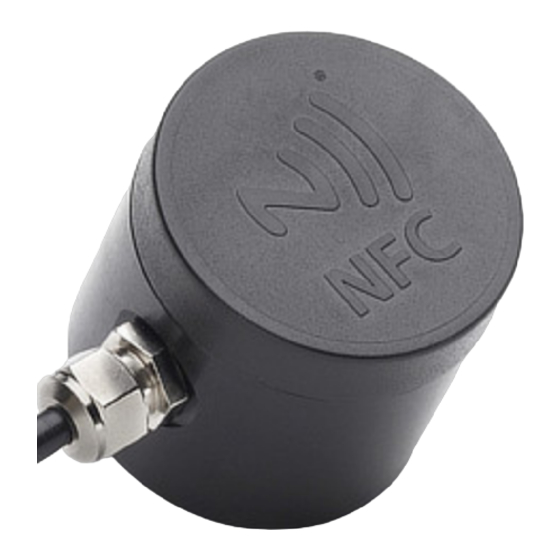Calex PyroNFC Series Panduan Operator - Halaman 7
Jelajahi secara online atau unduh pdf Panduan Operator untuk Aksesori Calex PyroNFC Series. Calex PyroNFC Series 9 halaman.

IMPORTANT
Be aware of the following when using the sensor:
•
If the sensor is exposed to significant changes in ambient temperature (hot to cold, or cold
to hot), allow 20 minutes for the temperature to stabilise before taking or recording
measurements.
•
Do not operate the sensor near large electromagnetic fields (e.g. around arc welders or
induction heaters). Electromagnetic interference can cause measurement errors.
•
Wires must be connected only to the appropriate terminals.
•
Ensure the sensor is grounded at one point: either the cable shield termination, or
the mounting screws, but not both.
•
When the power is switched off, allow at least 15 seconds before switching the power back
on.
LENS CLEANING
Keep the lens clean at all times. Any foreign matter on the lens would affect measurement
accuracy. Blow off loose particles (if not using the air purge accessory) with an air 'puffer'.
MAINTENANCE
Our customer service representatives are available for application assistance, calibration,
repair, and solutions to specific problems. Contact our Service Department before returning
any equipment. In many cases, problems can be solved over the telephone. If the sensor is not
performing as it should, try to match the symptom below to the problem. If the table does not
help, call Calex for further advice.
TROUBLESHOOTING
Symptom
No output
Inaccurate measured
temperature
Erroneous
temperature (voltage
output)
Erroneous
temperature
(thermocouple
output)
Probable Cause
No power to sensor
Target too small for
sensor's field of view
Target is a reflective
metal surface
Field of view
obstruction
Dust or condensation
on lens
Incorrect wire
connections
Output temperature
scale mismatch
No Cold Junction
Compensation (CJC) or
wrong type of
extension cable
Solution
Check power supply and wiring
Ensure the sensor's view is completely filled
by the target. Position the sensor closer to
the target to measure a smaller area.
Measure a non-reflective area, or paint or
coat a measurable area of the target to
make it non-reflective
Remove obstruction; ensure sensor has a
clear view of target
Ensure lens is clean and dry. Clean gently
with a soft lens cloth and water. If problem
recurs, consider using an air purge collar.
Check wire colour codes
Re-scale input temperature range on
measurement instrument to match sensor
Enable CJC on measurement instrument;
ensure extension cable and connectors are
of the correct thermocouple type
7
